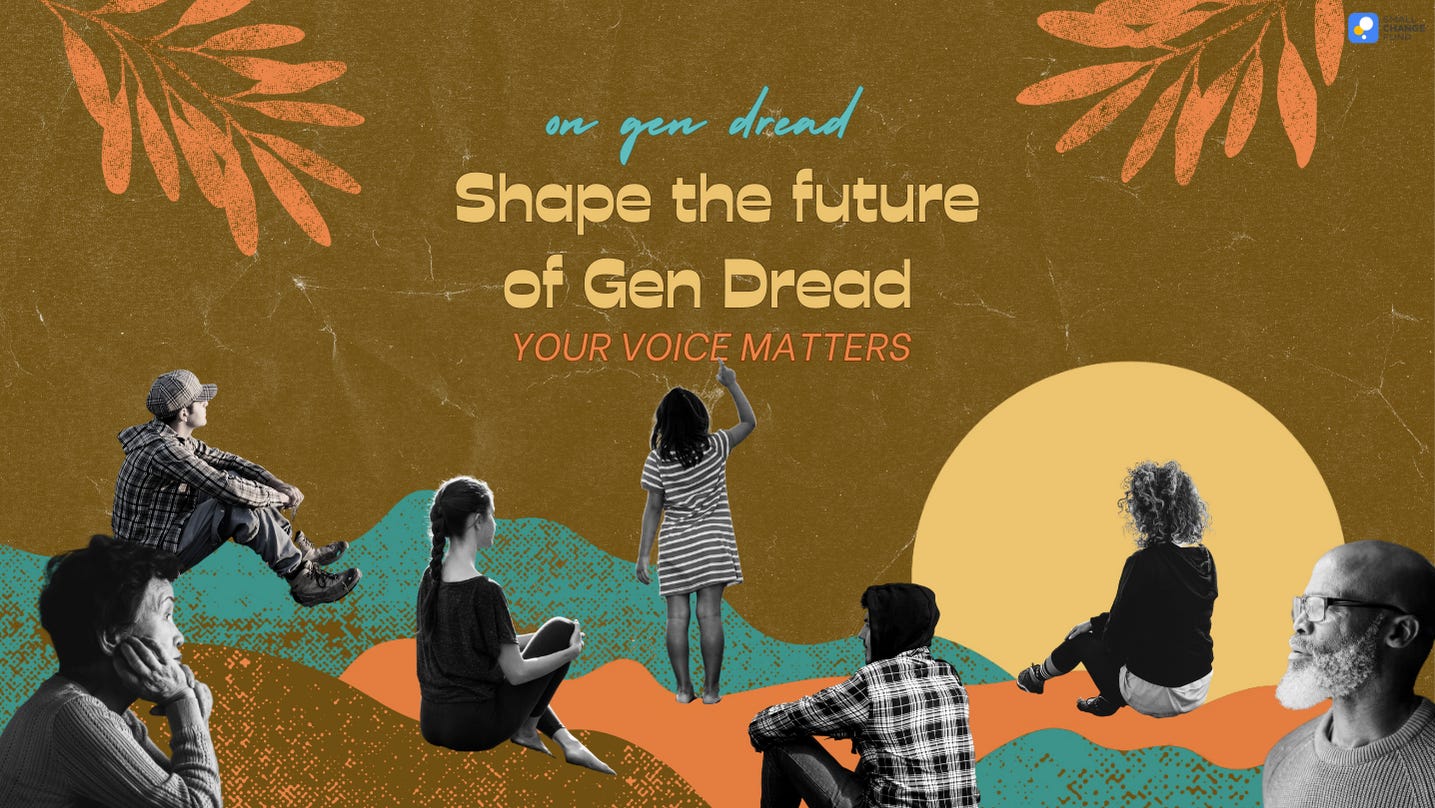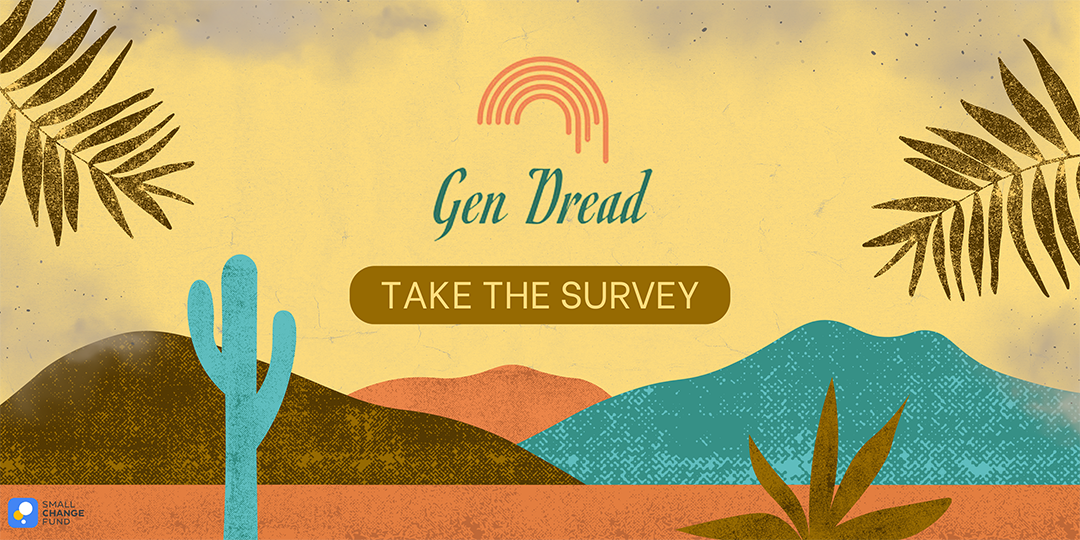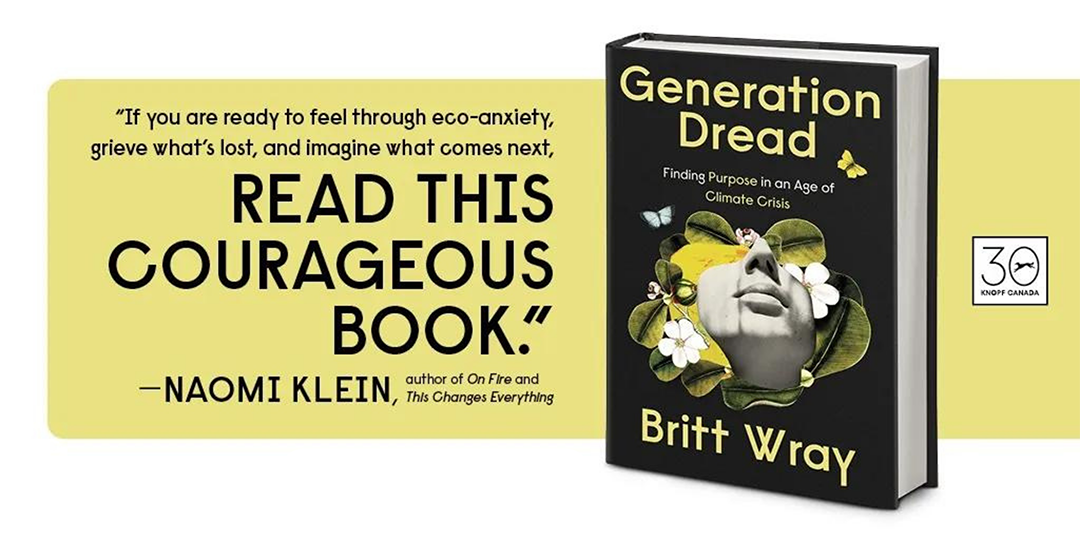Distressed by recent Canadian wildfires? Read this.
+ Help shape the future of Gen Dread, your voice matters!
Hi there!
Welcome to Gen Dread, a newsletter about how the climate crisis is making us feel, why that’s happening, and what we can do about it. Subscribe now to find community, comfort, and practical coping strategies from experts all around the world.
Hey, you! Yes, you!
We’ve been at this newsletter for nearly 3 years now (bananas!). In all that time, Gen Dread has been 100% free. We are now specifically asking for something back from you dear reader, and that is:
Would you oh-so-kindly take a couple of minutes to answer some questions about who you are, why you engage with Gen Dread, and what you’d like to see more of in this space?
As we shared last week, the Gen Dread team is hard at work imagining some new and exciting possibilities for what we can offer this community…but our first step is to collect as much information as we can about what our community uses, needs, and wants. We’d be SO grateful if you filled out the survey below.
And to sweeten the deal, we’re offering you the chance to win one of 5 signed copies of Generation Dread, Britt’s courageous and comforting book about finding your unique purpose in the climate emergency, and how emotional distress can be a compass for doing so.
Distressed by the recent Canadian wildfires?
This week we’re passing the mic to a pioneering climate-aware therapist to respond to the horrors of the recent Canadian wildfires, their blanket of smoke, and the emotional toll they’ve taken on millions of people experiencing their lingering effects.
Caroline Hickman is a climate-aware psychotherapist and researcher working with the Climate Psychology Alliance (UK and US).
Fear & Hope by Caroline Hickman
When those iconic and terrifying images started to appear in the news last week of the smoke from the Canadian wildfires covering New York it was hard to know how to react at first. I heard many people struggling to express their mixed feelings. From fear and terror of the smoke and orange skies, disbelief, concern about the people directly impacted and evacuating in Canada, the hope that this might start to wake more people up to the seriousness of the climate crisis, to the joy of seeing firefighters arrive in Canada to help, from Africa. People were scared, and people wanted to help.
One young woman contacted us in acute distress after her flight had to land in New York through the smoke and she was terrified and overwhelmed by the smell and the difficulty breathing. ‘It was like we were dropping into hell!’ She struggles with climate anxiety all the time but has been managing to contain her panic until she was traumatised by this landing. She wanted to run out of the airport but knew that there was nowhere for her to go to get away. Her connecting flight was delayed because of the smoke so she was in a state of panic with no way out.
A young man in Scotland (UK) told us that he was full of rage and despair seeing the smoke in New York and fearing the wildfires in Scotland that were devastating land that he loved. He wanted people to realise that this was happening all over the world.
What can help when coping with these threatening events?
One of the most important things to remember about climate emotions is that they are never simple, nor confined to single emotional responses, you might feel scared and angry and hopeful, often in quick succession. It’s important to allow and validate all these emotional responses, don’t suppress any because you are unsure why you are feeling that way, and don’t search for the ‘right’ emotional response, because they all make sense in what is a rapidly changing and unpredictable world that throws up unexpected challenges.
There are multiple direct and indirect effects of climate change on mental health. This includes short term direct shock in response to the extreme events as well as the longer-term stressor of smoke and air pollution alongside the psychological trauma, stress, and grief. For the young woman flying into New York, I reminded her that although it was terrifying, her shock was making it harder for her to cope with her feelings, and that she needed to tell herself that although it was ok to be scared, she also needed to remember that she was safe and would be able to get through this. The young man needed to have his frustrations validated and heard, the fires in Scotland were not getting as much press attention, but that did not mean that they were unimportant to many people. He needed to use his anger to speak out and be heard.
The fires in Canada may have covered New York in smoke, but the rest of the world was not immune from the awfulness of those images and the stories from survivors. Those fires may have been in Canada, but the global impact was significant.
If you liked reading this, feel free to click the ❤️ button on this post so more people can discover it on Substack 🙏🏼
Making Waves
In her talk at Frontiers Forum Live 2023, Britt Wray explored how today's ecological crises can push us into a state of grief, numbness, or fatalism, causing burn out and making us question big life decisions such as whether to have children. She also revealed how this grief can mobilize and transform us, emphasizing what we can do to channel it and its power to spark transformational change. Frontiers Forum Live is an annual event that showcases science-led solutions for healthy lives on a healthy planet, and this year Britt shared the stage with environmental and philosophical luminaries including Johan Rockström, Al Gore, Jane Goodall, Yuval Noah Harari, and Ban Ki-moon.
As always, you can share your thoughts and reach the Gen Dread community by commenting on this article or replying to this email. You can also follow along on Twitter and Instagram.
‘Till next time!








Thanks so much for this wonderful reflection. I am a former wildland firefighter and just want to remind and/or inform y'all that fires are a natural part of all ecosystems in one way or another. Fire suppression is one of the reasons that fires have been getting bigger and more volatile. I write a newsletter about this but Alie Ward also just re-released two great episodes on fire ecology and Indigenous fire. For those who are feeling a lot of anxiety about the smoke in particular I really suggest listening to that episode (the Ologies podcast) for some comfort, and to see if there are ways you can advocate for prescribed and/or cultural fire in your neck of the woods. Thanks so much!!
Thanks for the video of Britt at Frontier Forum. It’s so important to hear that we can go through the “crucible” of climate dread and emerge on the other side with stronger commitments and better self-knowledge.
I’m five years into my climate angst that inspired action and it’s been an unexpected period of growth. I’m glad to find this community!